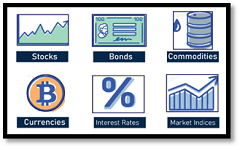Advantages and Disadvantages of DerivativesFinancial products known as derivatives are traded on the market and have underlying assets as their primary source of value. Security with underlying assets like equities, currencies, commodities, rare metals, stock indexes, etc., gives this security its value. Derivatives represent an agreement made by two or more individuals. 
This agreement relates to the parties' exchange of funds and sales and purchases of assets. The parties' contractual obligations, the contract's maturity date, the notional amount, and the consequent values of the underlying instruments are some of the conditions that apply when this contract is entered into. The primary purposes of derivative instruments are risk hedging and profit-making through speculation on the value of the underlying investment. Here are some advantages and disadvantages of Derivatives: Advantages of derivatives1. Reducing exposure to risk The risk associated with varying price movements is hedged through derivative contracts. The value of the underlying assets determines how much these contracts are worth. The contracts are mostly employed for risk hedging. As a result, gains in derivatives contracts may be used to cover losses in the underlying commodities. A derivative contract, for example, that goes in unfavourable or in the opposite way of the value of the asset the client owns might be purchased by the investor. 2. Improve market effectiveness The efficiency of the financial market is increased via derivatives. These contracts are employed in order to duplicate asset payoff. As these contracts result in price corrections through arbitrage, it helps in determining the fair and accurate economic worth of the underlying commodity. Market price efficiency and equilibrium are both achieved in this way. 3. Non-binding agreements An investor is considered to be buying the right to execute a derivative contract when he or she invests in one on the open market. He is not obligated to carry out its option, though. Non-binding contracts, therefore, have a benefit and provide a great lot of freedom in carrying out the investment strategy. 4. Returns on borrowing Extreme returns are now feasible for investors, which may not be the case with traditional financial vehicles like bonds and stocks. Contrary to equities, investors can quickly double their money when they invest in derivative markets. 5. Computing the underlying asset price The price of the underlying assets can be determined with the aid of derivatives contracts. The current prices of future contracts provide an approximate idea of commodity prices. 6. Access to unavailable markets or assets Derivatives also give people access to markets and resources that are otherwise closed off. With the aid of interest rate swaps, people can borrow money at a lower or more advantageous rate of interest than they might if they borrowed it directly. 7. Minimal transaction costs Investors benefit from the reduced transaction costs associated with trading these products. This serves as a tool for risk management and price fluctuation protection. In comparison to other investments like shares or debentures, investing in derivatives is less expensive. Disadvantages of derivatives1. High risk involved Due to the significant volatility of the underlying securities prices, high-risk derivatives contracts are subject to a high level of risk. Due to the fact that derivatives are typically sold on open markets, the pricing of these underlying securities, such as shares or metals, is constantly fluctuating. This carries a significant amount of danger. 2. Costly alternatives Due to the fact that they are created from other securities, derivatives are difficult to evaluate. In addition, there are not as many "players" in the derivatives market as there are in the stock market. As a result, there is significantly higher bidding, which raises the price. 3. Time-bound The fact that derivatives have a set contract life is the main factor making the market dangerous for investors. The contract is useless after their life is through. 4. Complexity The majority of individuals are unaware of how complicated the derivatives market is. As a result, it encourages fraudsters to take full advantage of this weakness and employs derivatives to create appealing schemes targeting non-professional and professional investors. 5. Imaginative elements Derivatives are a tool used for speculative purposes to generate profits. Due to the unpredictability and high level of risk associated with derivatives, significant losses can occasionally result from excessive speculation. 6. Expertise is needed One of the main issues with trading derivative products is this. Compared to other securities, such as equities and commodities, investors need a higher level of knowledge and ability to trade in these instruments. |
 For Videos Join Our Youtube Channel: Join Now
For Videos Join Our Youtube Channel: Join Now
Feedback
- Send your Feedback to [email protected]
Help Others, Please Share









